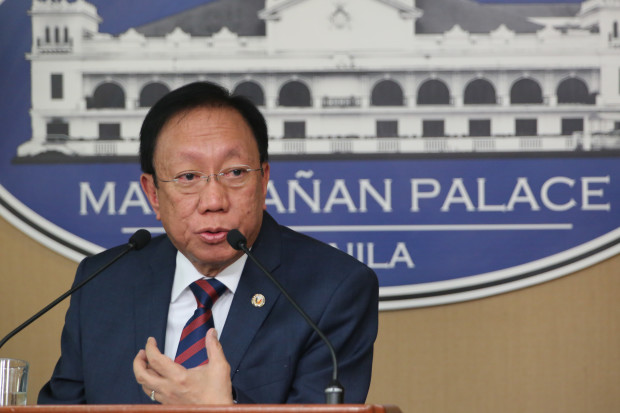SolGen moves to stop SC from acquiring details on drug deaths

Solicitor General Jose Calida. Presidential Photo
Calling it “patently irrelevant,” government lawyers on Friday asked the Supreme Court (SC) to reconsider its Dec. 5, 2017 order requiring them to submit details of the 3,806 killed under legitimate police operations from July 1, 2016 to Nov. 30, 2017 in connection with the government war on drugs.
In a 14-page motion for reconsideration, Solicitor General Jose Calida said the SC cannot declare a law or ordinance as unconstitutional based on the abuses committed by its implementor.
“The criterion by which the validity of the statute or ordinance is to be measured is the essential basis for the exercise of power, and not a mere incidental result arising from its exertion. This is logical,” Calida said.
“Just imagine the absurdity of situations when laws may be declared unconstitutional just because the officers implementing them have acted arbitrarily,” Calida said adding that if the basis would be the abuses committed by the police officers, then the Revised Penal Code should have been declared unconstitutional.
Last year, the Supreme Court conducted an oral argument in connection with the two consolidated petitions filed by the Center for International Law (CenterLaw) through lawyer Joel Butuyan on behalf of the residents of 26 barangays in San Andres Bukid, Manila City and the Free Legal Assistance Group (FLAG) led by lawyer Jose Manuel Diokno.
Article continues after this advertisementThe CenterLaw petition is seeking the issuance of a writ of amparo to shield the residents of 26 barangays in San Andres Bukid, Manila City against the government’s anti-illegal drug war.
Article continues after this advertisementThe FLAG petition, on the other hand, is seeking to declare as unconstitutional PNP’s CMC 16-2016, or “Oplan Double Barrel,” which Diokno said allows the police to neutralize suspected drug pushers.
The group also filed the petition for the SC to issue protection orders for the relatives of three persons who ended up as victims of “extralegal killings” in the anti-drug campaign.
Diokno said that the killings of Ryan Dave Almora and Rex Aparri, and the shooting of Jefferson Soriano, are part of “extralegal killings,” thus covered by the rule on the writ of amparo.
CMC No. 16-2016 has five stages, namely: the collection and validation of information stage where information on suspected drug users and pushers is acquired and verified through a five-tier validation process; the coordination stage with LGUs, PDEA, DDB, the Anti- Drug Abuse Councils, the Philippine Information Agency and NGOs; the house-to-house visitation stage; the processing and documentation stage where the voluntary surrender form is accomplished and the person- of-interest is interviewed; and the monitoring and evaluation stage where police action is taken in case of continued drug activities.
The high court order the Office of the Solicitor General to submit the following:
- Names, addresses, gender of those killed
- Place, date and time of drug ops
- Names of PNP team leader and team members who participated in the operation the pre-operation plan
- Post ops report
- Whether search warrants or warrants of arrests were issued
- Names of representatives of media, NGOs and barangay officials present during the police operations
On those “death under investigation,” the high court asked the submission of the following:
- Names, addresses, gender, ages of those killed
- Date, time and place of the killing
- Scene Of the Crime Operatives (SOCO) team leader and members who investigated the killing
- Investigation reports
- Charges have been filed against the suspects if there are any
The high court also asked the government lawyers to submit the records of all buy-bust operations conducted in San Andres Bukid, the subject of one of the two petitions, the pre-operations plan and post-operations plan.
But Calida, in its motion for reconsideration said the high court “cannot go beyond determining the textual commitment of PNP CMC No. 16-2016 and DILG MC No. 2017-112 to the Constitution.”
“In resolving constitutional issues, it is not allowed to receive and weigh evidence, which it will necessarily perform upon receiving the information and documents required of the respondents,” Calida said.
Calida added that the documents the Supreme Court wanted contain sensitive information that has national security implications.
He said that while the constitution guarantees right to information, such right is not absolute.
“The production of documents required …involve information and other sensitive matters that in the long run will have an undeniable effect on national security: it could spell the success or failure of follow-up operations of police and other law enforcement bodies, aside from endangering the lives of those on the list as well as those already in custody,” Calida said.
Calida said they have no intention to defy the high court’s order but the filed the motion for reconsideration to strengthen the rule of law and prevent abuse of judicial processes. /jpv
RELATED STORY
Gov’t ordered to yield PNP’s voluminous records on drug deaths